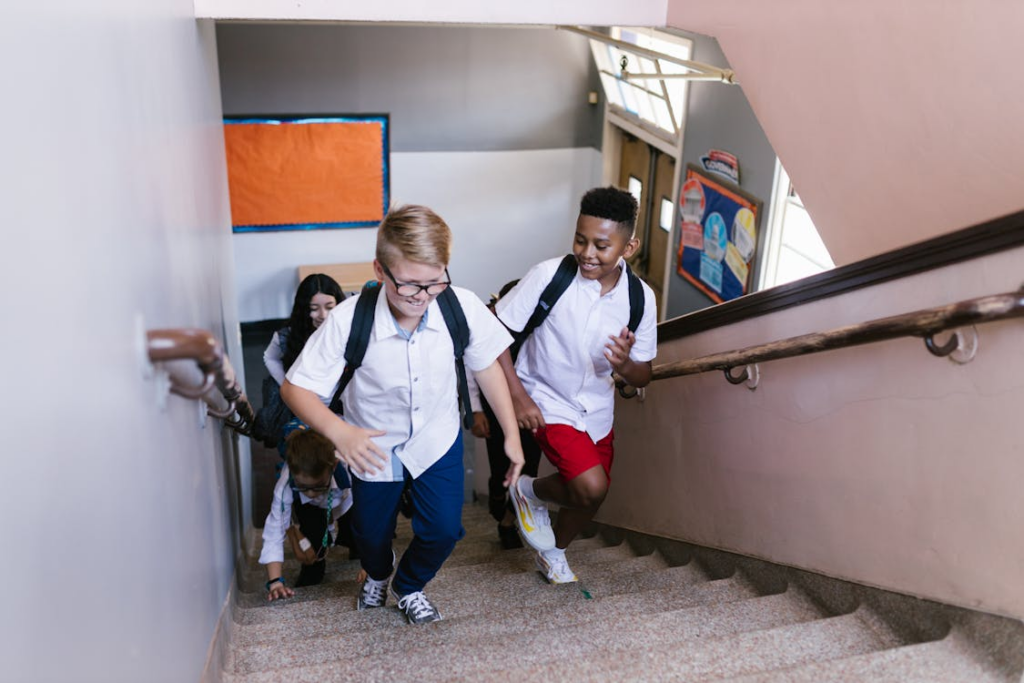As your child embarks on their journey into Year 7, it marks a significant milestone in their academic and personal development. This period can be both exciting and challenging for students and parents alike. Here’s a comprehensive guide to help you navigate this transition smoothly, including what to expect, how to prepare your child, and what they will be learning.
What to Expect in Year 7
Year 7 brings many changes for your child. The school day will likely be longer, with a shorter lunch break. Your child may have up to five different lessons a day and will move between classrooms for each subject. This means they’ll be meeting new friends and will probably be in different groups for various lessons.
They will have a form teacher who will register them each day, usually in the morning. This form group could be made up of children their age or a mixture of children from different year groups. Most schools will require them to wear a uniform and they’ll start receiving homework. Additionally, your child may have further to travel, which may involve using public transport.
Preparing Your Child for Year 7
There are several ways to prepare your child for this significant change:
-
- Familiarize with the School: Revisit the school website to check any Year 7 information, such as what will happen on the first day. Being positive and allowing your child to form their own opinions about lessons and teachers can be very helpful.
-
- Discuss the School Day Structure: Talk to your child about the different structure of the school day, the subjects they’ll be studying, and the fact that they’ll be getting homework. Discuss how they will organize their homework, and whether they will have school lunches or take sandwiches. Also, think about how they will get to school, whether by walking with friends or taking public transport.
-
- Use Resources: Spend some time reading through useful booklets or resources about starting in Year 7. These often include tips for your child and activities to encourage a positive mindset.
What Your Child Will Be Learning in Year 7
Year 7 is not just about new subjects; it’s also about learning to be more independent. This includes managing new travel arrangements, getting to grips with a new building, understanding a new timetable, and meeting new friends and teachers.
In terms of lessons, your child will likely be learning a language and three distinct sciences: biology, physics, and chemistry. They’ll also study PE, design technology, art, music, drama, ethics or religious education, history, geography, English, and maths.
Your child will be taught by subject specialists who are passionate about their curriculum areas. This means they may develop an enthusiasm for new subjects. Form tutors and heads of year also play a pastoral role, so they should be your first point of contact with any general worries.
Building a Relationship with the School
The parent/teacher/school relationship can feel different at secondary school. Your child will be taught by up to 10 different teachers, so you are unlikely to get to know them as well as their primary school teachers. Here’s how to manage this relationship effectively:
-
- Stay Informed: Keep up to date with school newsletters, websites, and communications from teachers.
- Attend Events: Participate in school events, parent-teacher meetings, and other opportunities to engage with the school community.
-
- Volunteer: If possible, volunteer for school activities to stay connected and show your child that you value their education.
Supporting Academic Success
To support your child’s academic progress:
-
- Create a Study Routine: Establish a consistent time and place for homework and revision to instil good study habits.
-
- Encourage Reading: Reading widely helps with all subjects. Discuss books and articles your child finds interesting.
-
- Stay Organized: Use planners or apps to keep track of assignments and deadlines. Encourage your child to break tasks into manageable chunks.
-
- Communicate with Teachers: Attend parents’ evenings and stay in touch with teachers to monitor progress and address any concerns early.
- Provide Resources: Ensure your child has access to necessary study materials, whether it’s books, stationery, or online resources.
Navigating Social Changes
Year 7 is also a time of significant social change as children move from primary to secondary school. Here’s how you can support your child:
-
- Encourage Friendships: Help your child develop healthy relationships by encouraging participation in school clubs and activities.
-
- Discuss Peer Pressure: Talk about the importance of making good choices and standing up for themselves in challenging situations.
-
- Promote Independence: Give your child opportunities to make decisions and learn from their experiences. This fosters confidence and self-reliance.
- Monitor social media: Stay aware of your child’s online activities and educate them about safe and respectful online behaviour.
Emotional Wellbeing
Supporting your child’s emotional health during this transition is crucial:
-
- Open Communication: Maintain a supportive environment where your child feels comfortable sharing their feelings and concerns.
-
- Recognize Stress Signs: Be alert to changes in behaviour that might indicate stress or anxiety, such as irritability, withdrawal, or changes in eating or sleeping patterns.
-
- Promote Balance: Encourage a balance between schoolwork, hobbies, and relaxation. Over-scheduling can lead to burnout.
- Seek Help When Needed: If your child is struggling emotionally, don’t hesitate to seek support from school counsellors or external professionals.
Encouraging Extracurricular Activities
Participation in extracurricular activities enriches your child’s school experience:
-
- Sports and Fitness: Physical activity is essential for health and can be a great way to make friends and develop teamwork skills.
-
- Creative Arts: Activities like drama, music, and art allow for self-expression and creativity.
-
- Clubs and Societies: Joining clubs can help your child discover new interests and talents.
- Volunteering: Encourages a sense of community and responsibility.
Practical Tips for Parents
Here are some practical tips to help you support your Year 7 child effectively:
-
- Morning Routine: Establish a morning routine that allows enough time for breakfast and a calm start to the day.
-
- Healthy Lunches: Pack nutritious lunches that provide energy for the day. Encourage healthy eating habits.
-
- School Supplies: Ensure your child has all the necessary supplies for their subjects, including proper school uniform.
- Travel Arrangements: If your child travels to school independently, discuss safe travel routes and practices.
Understanding School Policies
Familiarize yourself with the school’s policies on:
-
- Attendance: Regular attendance is crucial for academic success. Understand the procedures for reporting absences.
-
- Homework: Know the school’s expectations for homework and how it fits into the overall learning plan.
-
- Behaviour: Understand the school’s behaviour policy and discuss it with your child to ensure they know what is expected of them.
- Assessment: Be aware of how and when your child will be assessed, including any exams or tests.
Preparing for the Future
While Year 7 is about settling into secondary school, it’s also the start of preparing for future academic and career paths:
-
- Discuss Interests: Talk with your child about their interests and how they might translate into future subjects or careers.
-
- Goal Setting: Encourage your child to set short-term and long-term goals. This can motivate them and give direction to their efforts.
- Explore Options: Keep an open mind about future educational and career options. Expose your child to different possibilities through conversations, visits, and research.
How can Educate Excellence help?
Here at Educate Excellence we can help ease the transition for both parents and children. Our sessions bridge the gap between primary and secondary school, allowing for a smooth transition. You can find all your child’s resources on the portal and if you or your child have any anxiety around starting the new year our tutors are always here to help. Please either contact Fayas the head of education or your child’s personal tutor.
Year 7 is a pivotal year in your child’s education journey. By staying engaged and supportive, you can help your child navigate this transition successfully. Focus on creating a balanced environment that fosters both academic success and emotional wellbeing. With your guidance, your child will be well-prepared to thrive in Year 7 and beyond.


